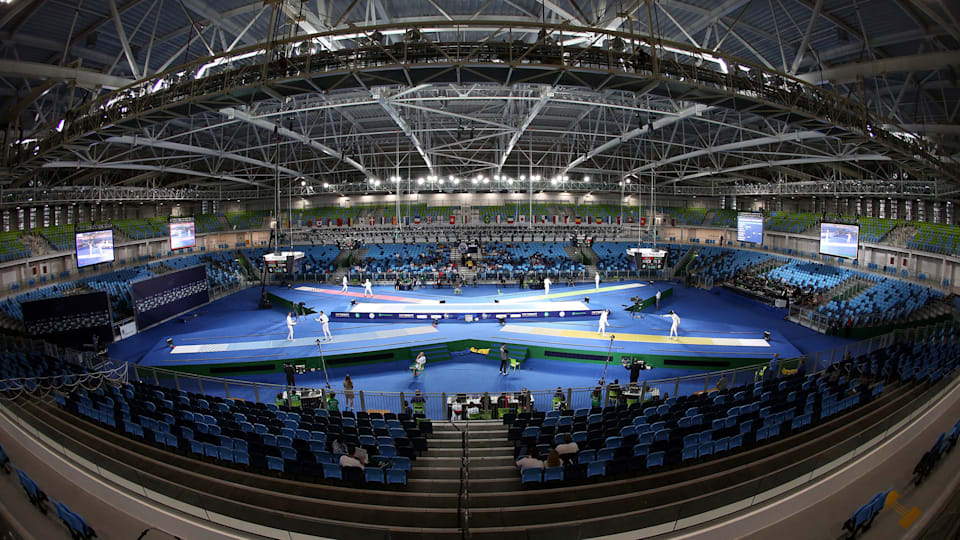
The Carioca Arena 3 at Barra Olympic Park in Rio de Janeiro provided the setting for the Team World Championship Finals at the end of April. Doubling up as the test event for Rio 2016, the competition saw six-time Olympic foil gold medallist Valentina Vezzali bow out of the sport with yet another medal around her neck.
Though the FIE does not hold full world championship programmes in Olympic years, it does stage tournaments for the two fencing events that are rotated off the ten-event Olympic schedule every four years. Dropping off the schedule at Rio 2016 are the men’s team sabre and the women’s team foil, with their respective world championships providing the perfect opportunity to test out the facilities at Barra Olympic Park’s Carioca Arena 3 on 25-27 April.
“The importance of the test event is that it tests all things which are possible to test before the Olympic Games,” said FIE Sports Director Krisztian Kulcsar. “That means that we test the venue, we test the technology and, most importantly, we test the procedures regarding the presentation.”
“This is the final version of the platform and the podium,” he continued. “Certainly, we have detected some minor issues that need to be corrected. This venue is different to what we usually have in fencing.
“In fencing normally we have spectators only on the two sides of the field of play. In this arena, with the shape of the venue, we have to take care of the spectators who are sitting at the two ends of the field of play. So with this X shape, we provide better visibility for them.”
Explaining the importance of the event from his point of view, Arena Cariocas Venue Manager Einaldo Batista said: “This is a fantastic opportunity for us to train our team. We had seven tests before this one, but this is the most important because it’s the first time that we’ve trained our team for this venue, and it’s the first time that we test this venue.
“This venue has a lot of new things for our team training, for our team to be aware. We test the hydraulic system, lighting and air conditioning. This is the first time we have turned on the air conditioning. It’s important for the infrastructure and the venue development that we know how the venue will be for the Games.”
As Kulcsar went on to say, the competition also provided an opportunity to trial a new scoring apparatus: “We’ve been developing it since London. We also have the same delegates, the same officials, the same referees working here who will work during the Games.”
Vezzali bows out in style
The event saw Italian six-time Olympic champion Valentina Vezzali make an emotional final appearance on the piste. The 42-year-old joined forces with Martina Batini and Rio 2016 qualifiers Elisa Di Francisca and Arianna Errigo to take Italy into the final, where they lost 39-45 to the Russian quartet of Inna Deriglazova, Larisa Korobeynikova, Aida Shanayeva and Adelina Zagidullina.
“Fencing has been my life,” said Vezzali, the winner of nine Olympic medals in what has been a glittering career. “My foil has been with me since I was a little more than six years old, and together we've shared emotions, disappointments, medals, misfortunes, and tears of both joy and anger. In life, after every end there is always a new beginning. Today, I don't see a sunset, but rather a sunrise of new matches to be faced and won.”
The French quartet, formed by Gaëlle Gebet, Astrid Guyart, Yasaora Thibus and Pauline Ranvier, beat the Republic of Korea 45-18 to win the bronze. Russia also took the honours in the men’s team sabre, with Aleksey Yakimenko, Nikolay Kovalev, Kamil Iragimov and Dmitryi Danilenko combining to score a 45-38 win in the final against the Hungarian quartet of Tamás Decsi, Nikolász Iliász, András Szatmári and Áron Szilágyi.
Romania took the bronze medal, as Alin Badea, Ciprian Ciprian Gălățanu, Tiberiu Dolniceanu and Iulian Teodosiu linked up to beat Iran 45-35.
